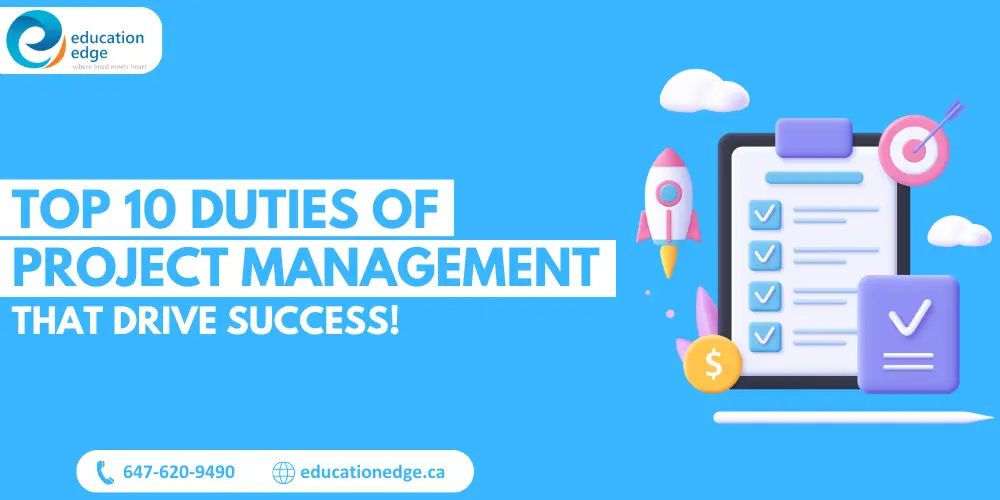
Curious to know what are the Duties of Project Management? Then you are in the right place. A project manager jobs is varied, requiring a combination of leadership, communication, and strategic skills. Hence, project management is about arranging activities to reach an objective, instead of just managing tasks. Effective project management can mean the difference between success and failure in the dynamic landscape of project completion.
Therefore, The top 10 duties that drive project management to success are explained in detail in this article.
Make sure to check: Project Management Entry Level Jobs with Required Skills & Salary
What is Project Management?
The project management involves allocating resources and tasks to efficiently achieve predetermined goals. To guarantee project success, it requires careful planning, executing, and monitoring.
Duties of Project Management
Here are the essential top 10 Duties of Project Management:

- Project Planning
- Risk Management
- Team Coordination
- Budget Management
- Quality Control
- Analyze Project Performance
- Conflict Resolution
- Time Management
- Stakeholder Communication
- Technology Integration
Duty 1# Project Planning
Effective project management requires careful planning, building the foundation for the project, establishing goals and objectives, and developing a plan of action for implementation.
Duty 2# Risk Management
A project manager detects potential risks, evaluates their impact, and proposes risk-mitigation solutions. This duty provides a safeguard for the project against unforeseen obstacles.
Duty 3# Team Coordination
Effective project managers recognize each team member’s abilities, facilitate teamwork, and guarantee everyone is working toward the same goal. Hence, team coordination is the essence of project management.
Duty 4# Budget Management
In project management, good financial judgment is essential. Project managers are responsible for making sure resources are distributed effectively, from the initial budgeting process to continuous financial control.
Hence, this responsibility protects the project from unnecessary financial risks.
Duty 5# Quality Control
High quality control procedures ensure that the final product meets stakeholders’ expectations and is in accordance with the project’s goals. So, it is one of the essential duties of project management.
Duty 6# Analyze Project Performance
After project completion, the project manager evaluates its efficiency and effectiveness, utilizing tracked data to identify and address potential future challenges.
Duty 7# Conflict Resolution
A skilled project manager handles conflicts quickly and using effective conflict resolution strategies. This duty helps to maintain a positive team atmosphere and keeps the project on track.
Duty 8# Time Management
Time is a valuable resource in project management. Hence, efficient use of time resources, defining realistic timeframes, and meeting deadlines are all essential duties.
Duty 9# Stakeholder Communication
Project managers have to involve stakeholders, manage expectations, and keep everyone updated on the status of the project. This duty encourages trust and teamwork.
Duty 10# Technology Integration
Integrating technology is a responsibility of modern project management. By improving productivity and simplifying procedures, integrating tools promotes project success.
Project Management Skills
Below are some essential project management skills necessary for the duties of project management.
- Leadership
- Communication
- Organization
- Team management
- Interpersonal skills
- Risk management
- Cost control
- Reporting and visualization skills
- Project management methodologies
- Good listening skills
- Strategic planning
- Strong Research skills
- Problem-solving
What Qualifications Are Required for a Project Management Career?
While anyone can work in project management, there are specific qualifications that can greatly improve your chances of success in this sector.
Therefore, having the following qualifications makes it easier to succeed in the project management career path:
- A bachelor’s degree in management, business or any relevant field
- Certification in project management such as PMP, CAPM etc
- A master’s degree in project management or business management
- Certified associate qualification in project management
- Relevant work experience in the field over a significant period
Perks of A Project Management Career
Choosing a career in project management has many perks.
- Boost Your Leadership Abilities: Project management develops ethical principles and honesty, which are required for good management as well as provide team management and motivation skills.
- Improve Your Problem-Solving Skills: Acquire the ability to identify and handle workplace issues while honing analytical abilities for data-driven solutions.
- Sharpen Technical Proficiency: Develop a comprehensive understanding of core business aspects vital for mentoring and coaching team members.
- Develop Interpersonal Communication: Effective communication with diverse stakeholders, team members, and senior management enhances both verbal and written communication skills.
- Learn to Manage Short Projects: Learn how to handle and complete brief projects in a timely and resource-constrained manner.
Ways to Get Started in a Project Management Career
Here are some steps you should take to get started in a project management career:
- Gain Relevant Education: Obtain a relevant degree in project management or a related field
- Obtain Certifications: Pursue certifications like PMP (Project Management Professional) for credibility
- Get Experience: Gain hands-on experience through internships or entry-level positions
- Develop Skills: Develop key skills such as communication, leadership, and organizational abilities
- Networking: Connect with professionals in the field through events or online platforms
- Build a Portfolio: Showcase your project management achievements and skills
- Stay Updated: Stay current with industry trends and project management methodologies
- Apply for Positions: Search for entry-level project management roles and apply consistently
- Continuous Learning: Invest in ongoing learning to stay competitive in the field
You may also check: What is Risk in Project Management? An Easy Guide
Frequently Asked Questions
1. Name the 5 main duties of project management/
ANS: The 5 main duties of project management are:
1. Project Planning
2. Risk Management
3. Team Coordination
4. Budget Management
5. Quality Control
2. Why is post-project evaluation necessary?
ANS: Post-project evaluation allows for reflection, analysis of outcomes, and continuous improvement in future projects.
3. What is the primary role of a project manager?
ANS: A project manager oversees and coordinates the entire project, ensuring it meets its goals and objectives.
4. How important is effective communication in project management?
ANS: Effective communication is essential because it fosters collaboration, builds trust, and keeps stakeholders informed.
5. Can adaptability be learned in project management?
ANS: Yes, adaptability can be cultivated through experience, learning from challenges, and a proactive mindset.
6. How can project managers promote team collaboration?
ANS: Project managers can promote team collaboration by encouraging open communication, setting clear expectations, and promoting a positive team culture.







